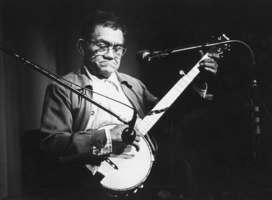 | Back to e-WV
| Back to e-WV
 The West Virginia Encyclopedia
The West Virginia Encyclopedia
 | Back to e-WV
| Back to e-WV
 The West Virginia Encyclopedia
The West Virginia Encyclopedia

Musician John Homer ‘‘Uncle Homer’’ Walker (February 15, 1898-January 4, 1980) was born in Mercer County. He was raised in Summers County and lived much of his adult life in neighboring Glen Lyn, Virginia. He usually worked as a laborer and farm hand.
Walker played the five-string banjo in the old clawhammer style, which preceded the three-finger picking popularized by bluegrass musician Earl Scruggs. Among the last in a tradition of Black Appalachian banjo players, he grew up with brothers who played guitar, fiddle, and mandolin. He started to play the banjo as a child, learning from his mother and an uncle. Walker traced his music directly back to the mid-19th century, noting that he had also learned from his maternal grandfather, who had been born into slavery in Virginia.
A popular performer during the folk revival period, Walker in his later years played music at the festivals of the 1970s, including the John Henry Folk Festival in Summers County, the Vandalia Gathering in Charleston, and the Smithsonian Institution’s 1976 Festival of American Folklife in Washington. He was featured in the 1972 documentary film, Morris Family Old-Time Music Festival, and was the subject of the 1977 film, Banjo Man, narrated by folk musician Taj Mahal.
Uncle Homer Walker died in Princeton.